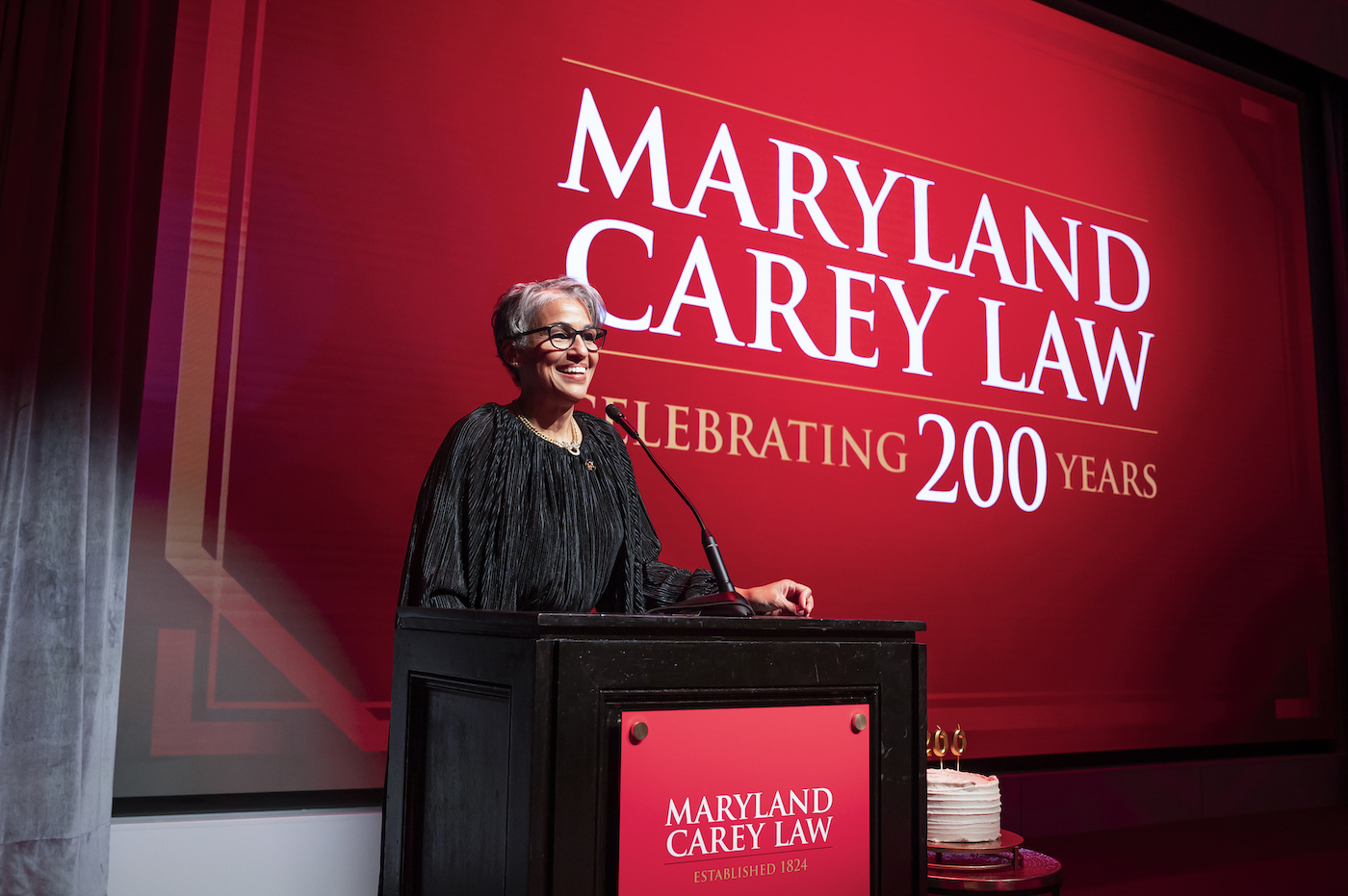Celebrating Bicentennial: Maryland Carey Law Continues Legacy of Excellence as It Marks 200 Years
June 12, 2024 Wanda Haskel
Read about how the school continues to demonstrate its commitment to transcendent innovation in legal education in the spring issue of “CATALYST” magazine.
Photo: Maryland Carey Law Dean Renée McDonald Hutchins, JD, addresses the crowd gathered in April to celebrate the school’s 200th anniversary. Photo by Larry Canner
Celebrating its 200th year in 2024, the University of Maryland Francis King Carey School of Law has emphasized an enduring commitment to excellence in education, scholarship, and public service; groundbreaking work on the integration of theory and practice; and a movement toward a more inclusive society within and beyond its walls. As we look back on its history, the school continues to demonstrate commitment to transcendent innovation in legal education.
One of the First Law Schools in the U.S.
In the early decades of the 19th century, the United States was in its infancy, with borders yet to be cemented and a system of government many considered experimental. American legal education, which largely consisted of apprenticeships and “reading law” independently, also was in its infancy.
As demand for legal services in the United States increased, universities began adding law faculty. In 1814, the same year the British attacked Baltimore’s Fort McHenry, the University of Maryland hired its first professor of law — prominent Maryland bar member David Hoffman. One of the first in the country to pen a curriculum and lectures for “law learning,” Hoffman went on to be the founding dean (1823-1836) of the Maryland Law Institute, which opened for regular evening instruction on Baltimore’s South Street in 1824. The Maryland Law Institute — as Maryland Carey Law was first known — is considered the fourth-oldest law school in the United States. By 1831, the student body had grown to about 30, and the institute moved to Courtland Street in 1833 to be closer to the courts. Moot court opportunities from the earliest days of instruction set a course for the school’s long history of leadership in the integration of theory and practice.
Reflecting its association with the university, the institute was renamed the University of Maryland, Department of Law in 1836 but temporarily shut down the same year until after the Civil War when it was reestablished as the University of Maryland, School of Law in 1869. Ten years later, the student body had grown to 60 and the faculty was made up of a who’s who of Maryland’s bench and bar with former Maryland Attorney General John Prentiss Poe (second cousin to author Edgar Allan Poe) as dean (1871-1909). In the late 1800s, the course of study went from a one- or two-year program to a required minimum of two years, illustrating the increasing stature of the legal profession and the expansion and complexity of discrete areas of the law.
Westminster Hall, adjacent to the law school, was built as a church in 1852 and is also a key part of the law school. Its cemetery is the resting place of Edgar Allan Poe and many other historical figures, including Founding Father James McHenry. In 1977, law school administrators led the establishment of the Westminster Historic Preservation Trust. This helped raise funding to refurbish the hall in 1983. Today, Westminster Hall is physically attached to Maryland Carey Law and serves as a gathering place for law school and private functions.
Read more about the law school and its anniversary at CATALYST magazine.
You can read the Spring 2024 issue of CATALYST magazine, which highlights UMB's new “Climate Change, Health, and Society” elective; innovations such as the School of Dentistry's Division of Artificial Intelligence Research; Carin Cardella, public information officer for UMB Police and Public Safety who has answered the call during state emergencies; new Health Sciences and Human Services Library Dean Emily Hurst and Chief Philanthropy Officer Greg Bowden; Fahren Nipple, autopsy assistant for the Office of the Chief Medical Examiner and assistant program director for the Master of Science in Forensic Medicine at the Graduate School; and much, much more!